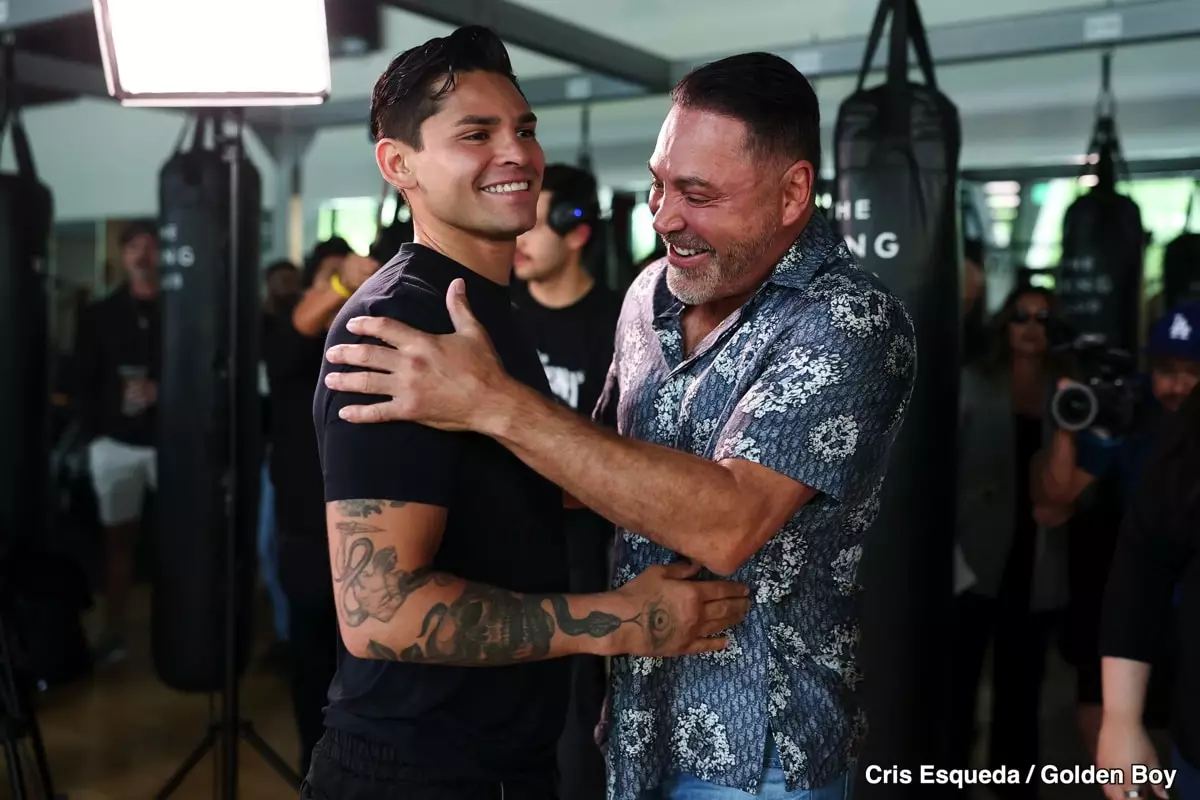Ryan Garcia’s recent assertions about Golden Boy Promotions and Oscar De La Hoya lay bare a troubling disconnect in contemporary boxing’s image culture. Promoted as the “boy wonder” or “social media sensation,” Garcia’s narrative of betrayal and disrespect reveals a fighter desperately seeking validation beyond his ring performance. His claims of being undervalued, misused, and misunderstood are familiar tropes for fighters who equivocate stardom with true boxing merit. However, beneath his bravado lies an unsettling truth: Garcia’s career trajectory exposes the peril of fighters who rely more on hype and media buzz than consistent skill and resilience.
Garcia’s accusations of being “disrespected” and receiving the “worst offer” after his recent loss suggest an image-conscious campaign to position himself as a wronged star. His emphasis on the failed rematch against Rolando ‘Rolly’ Romero and accusations that De La Hoya attempted to sideline him by favoring Raul Curiel demonstrate not only frustration but also reveal his crystal-clear lack of perspective. Fighters remain powerful entities in their narratives, yet success ultimately hinges on substance, not spectacle. Ryan’s perspective appears skewed—confusing celebrity status with boxing greatness—as he seems to believe that loyalty and respect are owed, overlooking the brutal realities of the sport.
The Myth of Reinvention: A Naïve Perspective
Garcia’s comparison of his resilience to Oscar De La Hoya’s resilience is not only naive but also ignores the fundamental differences in career and character. De La Hoya’s comeback stories were rooted in genuine adversity, years of elite performance, and a clear understanding of his strengths and weaknesses. Garcia, on the other hand, projects an image of a fighter promising more than he can consistently deliver.
He claims that De La Hoya “doesn’t respect” him because of perceived failures, yet fails to acknowledge his own shortcomings or the reality that respect must be earned through sustained performance. His bravado—that he is a “great fighter” with “star power”—comes off as a desperate attempt to manufacture value in a sport where fight results, consistency, and strategic growth matter more than personal branding. Public admiration for fighters like Garcia should be rooted in actual skill, not manufactured fame, a point he seems unwilling to accept.
The Specter of Future Decline and Flatlining Promises
Garcia’s predictions are dripping with arrogance: he’ll “bounce back,” regain his “star power,” and show a “vengeance” that will shake the boxing world. Such statements reveal a dangerous overconfidence rooted in fleeting popularity rather than tangible accomplishment. If Garcia proceeds to box lower-tier opponents or loses his rematch to Romero or others, his credibility—already shaky—will suffer irreparably.
His declaration that he has “one fight left” with Golden Boy and plans to “move on” paints a picture of astute independence. However, this narrative ignores the harsh reality that fighters who leave promoters often struggle to find meaningful opportunities, especially if they lack the necessary skills to compete at higher levels. Promoter loyalty, matchmaking, and the ability to navigate a challenging division are critical. Garcia’s reliance on social media notoriety as a substitute for boxing prowess is a double-edged sword; it elevates his profile temporarily but offers little long-term security.
The Illusion of Star Power in Modern Boxing
Ryan Garcia’s claim of possessing unmatched “star power” underscores a broader problem facing boxing today: the conflation of fame with skill. In an era where social media makes fleeting celebrity accessible, fighters are increasingly judged not by their ability to fight but by their attractiveness, social following, and media presence. Garcia’s few notable wins—particularly his victory over Devin Haney—are often dismissed as luck or superficial accomplishments. The idea that he can “bounce back” simply because of popularity reveals a fundamental misunderstanding of what it takes to be a true world-class boxer.
His prediction that his reputation will survive losses is optimistic at best. Boxing history demonstrates that resilience matters, but so does the level of opposition and performance. If Garcia’s next bouts are against mediocre foes, his star may shine briefly, but the moment he faces top-tier competition, his limitations will become apparent. Referring to himself as a “go-getter” and a fighter “coming back with vengeance” sounds more like a marketing pitch than a reflection of his true capabilities.
The Price of Unfulfilled Potential and the Fetishization of Fame
Ultimately, Garcia’s rants highlight a troubling trend: boxing’s increasing obsession with celebrity culture over genuine athletic achievement. The sport, which once celebrated grit, skill, and tactical intelligence, now often elevates fighters more for their social media following than their boxing skills. Garcia’s career exemplifies this shift—an athlete with early promise but lacking the consistent fundamentals necessary to dominate at the highest levels.
His dismissive attitude toward opponents and the sport’s inherent toughness suggests a shallow understanding of what it really takes to succeed. The boxing world needs fighters who fearlessly face adversity and focus on honing their craft, not those who rely on hype, popularity, or contrived rivalries to sustain their careers. Garcia’s claims, though loud and confident, serve as a cautionary tale of superficial stardom in a sport that demands true grit, resilience, and discipline—qualities he currently seems to lack.


Leave a Reply